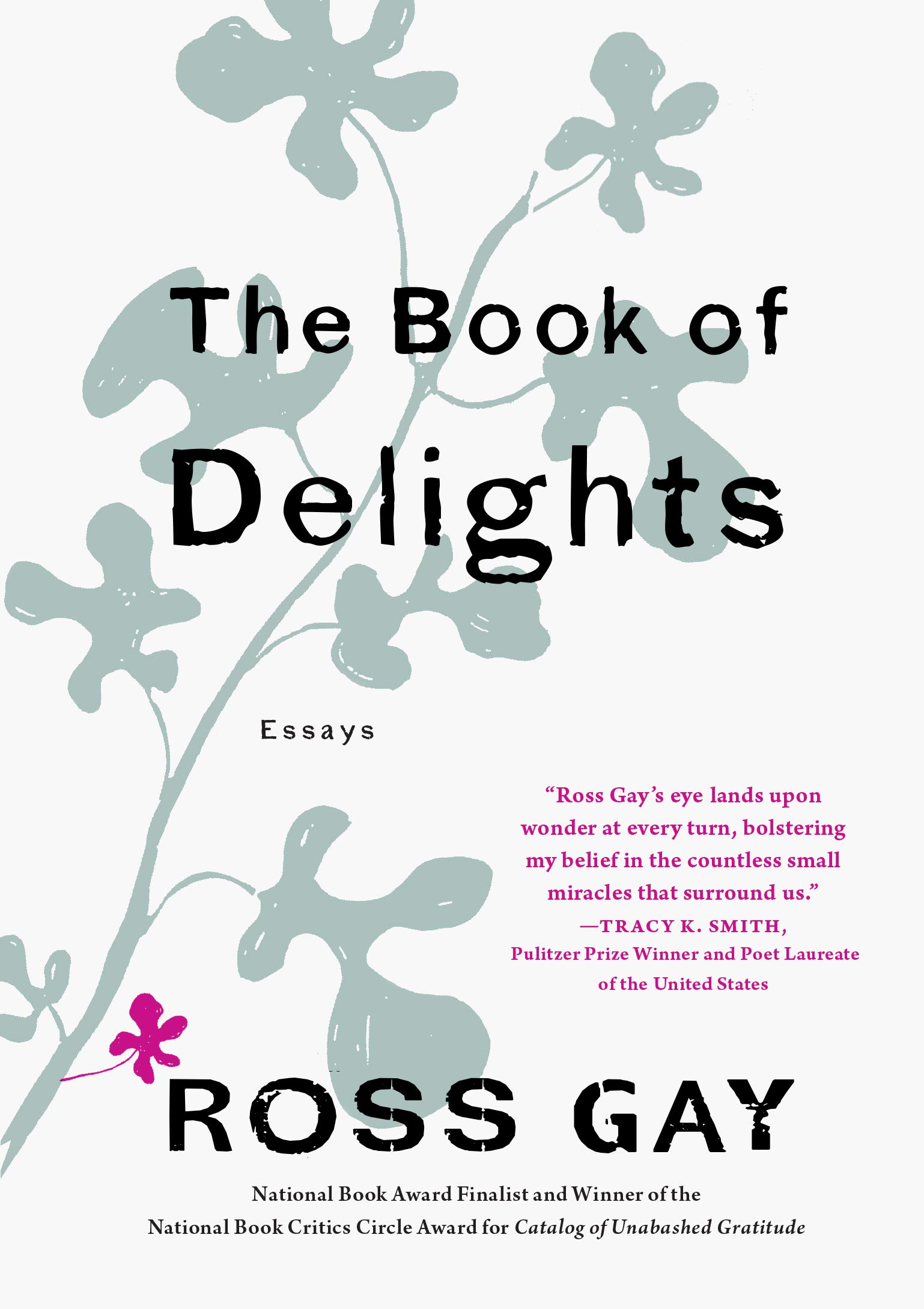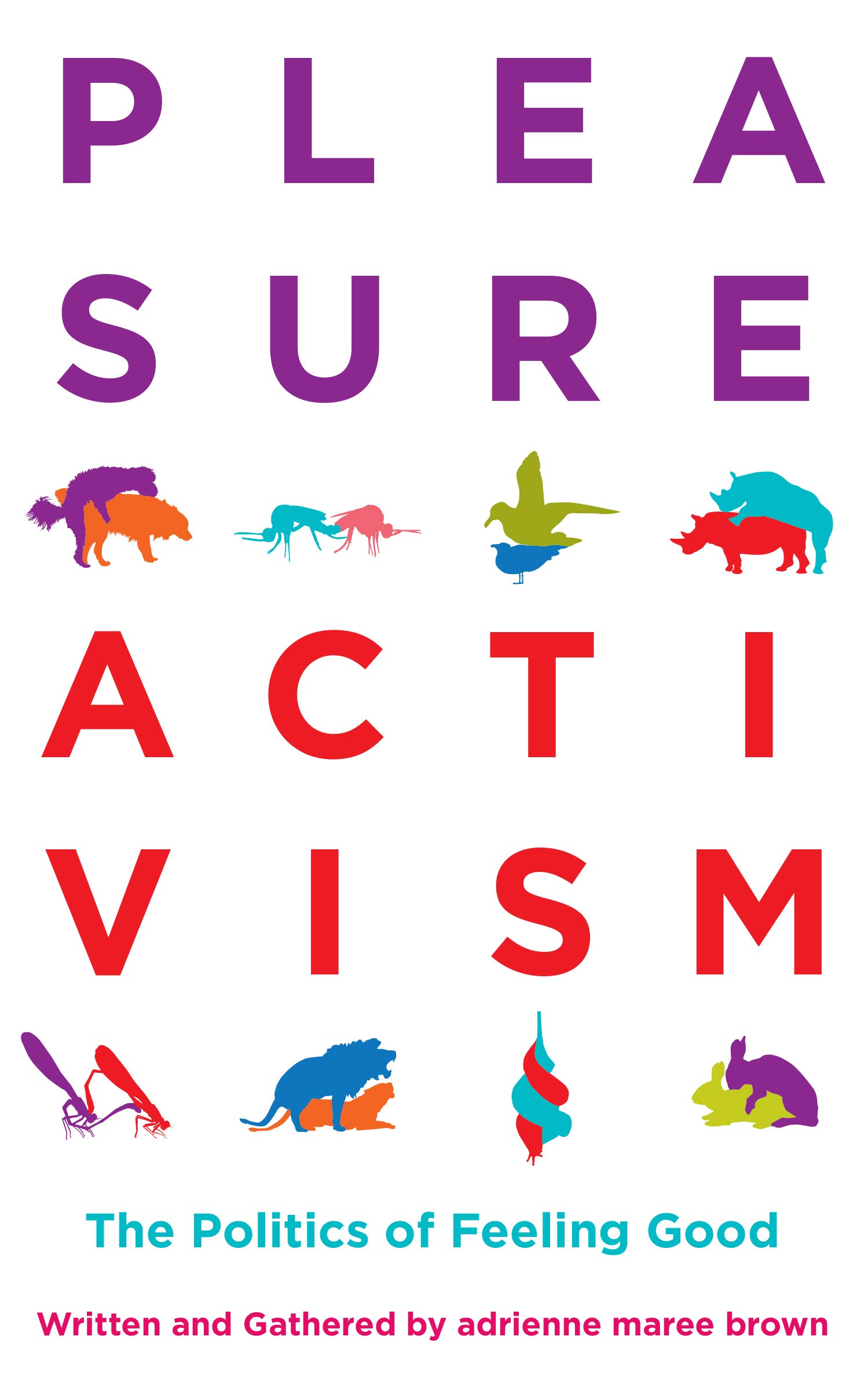I’ve never written about a book that could be characterized as happy. They seem to be few and far between in the world of serious literature, which sometimes seems to be composed strictly of books praised as “haunting” and “deeply necessary.” I don’t think I’m alone in seeking out books that reflect the heaviness of this political and ecological moment; ones oriented toward joy can feel like a luxury suitable to simpler, more peaceful times.
This February, two new books challenge that trend: Ross Gay’s The Book of Delights and adrienne maree brown’s Pleasure Activism: The Politics of Feeling Good. They focus on the discipline of delight and the practice of pleasure, and on reclaiming those emotions while immiserated under capitalism, racism, misogyny, and homophobia. They remind readers of the beauty and community around us, and help us imagine a future of interdependence and joyful abundance rather than one of imposed scarcity. As Brown writes: “Let … [pleasure] shape a future where feeling good is the normal, primary experience of all beings.”
Gay’s book is composed of 102 “essayettes,” selections from a year-long project to record one delight each day. None is longer than a few pages. Each was drafted quickly, according to the principle of “TEMPORAL ALLEGIANCE”: a daily “witnessing [of] one’s delight, of being in and with one’s delight.” The entries were written longhand and convey the physical pleasure of putting pen to page, feeling “this lavender Le Pen make the loop-de-looping we call language.” They’re rich with run-ons and parentheticals that smuggle in some extra delight or surprise. The stylistic quirks capture the “breathlessness” of Gay’s thinking about delight, his “not quite articulate pleasure that evades or could give a fuck about the computer’s green corrective lines.”
Like The Book of Delights, Pleasure Activism strays from well-defined forms. It reads like an extra-long zine with its heterogeneous mix of essays, poems, interviews with “pleasure activists,” and “hot and heavy homework” instructing the reader to trace their pleasure lineage and get in touch with their nipples. brown mainly works with social justice organizations, and her book is a tool for activists—or anyone—who wants to orient themselves toward pleasure, reclaiming “our whole, happy, and satisfiable selves from the impacts, delusions, and limitations of oppression and/or supremacy.”

(Photo: Algonquin Books)
All this might seem pretty Pollyannaish. I was tempted to close Pleasure Activism immediately after reading the footnote on the bottom of the first page, which asks the reader to masturbate before beginning the book “if you can,” and to do so again between each chapter, some of which are only a few pages long. But how is it, brown asks, that we came to believe our lives shouldn’t be centered on feeling good?
First she points to capitalism: It creates poverty for many and vast excess for the few, bringing about a “false scarcity” of pleasurable experiences. Black, brown, femme, disabled people, and others experiencing multiple forms of oppression are socialized to believe that “our health, our votes, our work, our safety, our families, our lives don’t matter–not as much as those of white men.” They are discouraged, brown writes, from prioritizing their pleasure or their boundaries.
But brown argues that “Our misery only serves those who wish to control us, to have our existence be in service to their own.” She urges readers to refuse an existence that is shallow, shitty, and gray, and to work instead to build “futures worthy of our miraculous lives.”
Still, for brown, pleasure isn’t just an end in itself. It’s also a political tool. “Prioritizing ourselves in love is political strategy, is survival,” she argues. “‘Yes!’ has a future.” She challenges her readers to ask what they desire—in their bodies, in their relationships, and in their world—and suggests a panoply of technologies already available for exploring and working toward those desires, like sexual experimentation, drugs, music, and humor.
The power of engaging in pleasure activism is most persuasive in brown’s section on sex after #MeToo. After the flood of stories on social media, some feminists argued it was time to turn from exposing sexual violence to envisioning a world without it. This imaginative work has been frustratingly slow to arrive, and it’s exciting to see brown engage in it with curiosity, openness, and pragmatism. She offers strategies for learning to flirt, to draw clear boundaries, and to understand that “no is a complete sentence.” In doing so, she sheds light on some of the gray areas #MeToo left un-illuminated: How do we stop feeling violated after sex we didn’t say no to, because we hadn’t understood what we wanted—because we hadn’t known how to say no? Brown envisions a world where consent is a “visceral yes that floods the entire body … a pre-orgasmic experience.” I was seduced.
More so than brown, Gay is conscious of the risks of writing about delight. He worries about projecting “a cloying half-fullness,” of lapsing into a simplistic, treacly exhortation to stop and smell the roses. In an interview about his most recent collection of poetry, Catalog of Unabashed Gratitude—a finalist for the National Book Award and the National Book Critics’ Circle Award—Gay imagines how “a table of very smart, very ironic people all dressed in black” will react to his exclamations of praise and delight: “Oh god, he’s exalting again.” One can imagine those critics making a similar statement about The Book of Delights, in which Gay lavishes attention on flowers, purple scarves, and “Babies. Seriously.” They’re soft, pretty, feminized things that men aren’t supposed to openly adore. In a society built largely on sexual repression and the Protestant work ethic, delighting can seem less serious, less rigorous than more productive modes of being.

(Photo: AK Press)
But Gay contends that delighting, and sharing one’s delight, are essential elements of resisting systems that do not spark joy, like racism, sexism, and capitalism. Gay makes this point most powerfully in an essayette about an aphorism of Thomas Jefferson’s. “The sun has not caught me in bed in 50 years,” Gay sees emblazoned in a hotel elevator. But Gay lovingly details his delight in “casting about in bed.” In long, deliciously winding sentences, he conveys the pleasure of “drifting in and out of dream as the warm hand of the sun falls through the blinds, moving ever so slowly across your body. Or as someone else’s hand (or your own) moves ever so slowly (or quickly) across (or into) your body.” Gay revels in a pleasure that is free, available to all, and doesn’t rest on another’s pain—setting readers up for a harsh assessment of Jefferson’s hypocrisy.
Jefferson trumpeted his self-discipline. But his wealth and prestige were built on the backs of those he disciplined: hundreds of slaves. “Picture him at his desk,” Gay writes, “up before the sun in his parlor, drinking tea he did not make or pour, eating a crumpet he did not make or put on a plate, scratching this and other pithy statements with his quill dipped into a well he did not fill, because he owned 600 people, most of whom were probably already at work.”
Delight, as Gay depicts it, is inefficient. It entails detours, helpless laughter, sleeping in public, getting lost in one’s garden, loitering. Gay devotes an essayette to the delight of loitering: Its synonyms, he writes, include “linger, loaf, laze, lounge, lollygag, dawdle, amble, saunter, meander, putter, dillydally, and mosey.” In this list, as in much of his prose, Gay revels in ambling toward his point, letting words linger and loaf across the tongue and the mind. Listing 12 synonyms for “loitering” is hardly efficient. But who wouldn’t be tickled by their sounds (“dillydally”; “lollygag”) and associations?
Because delight is inefficient, Gay suggests, it interrupts the constant cycles of production and consumption that structure so much of life in America. It involves “taking one’s time” back from an employer, or from a business owner who demands you pay to remain in their space. “This is a crime in America,” Gay writes, especially if you are poor or, like Gay, a person of color: anyone whose “body is supposed to be one of the consumables … around which so many ideas of production and consumption have been structured.”
Gay also challenges the capitalist dogma of individual flourishing, continually exploring the delights of interdependence: Public acts of kindness. Planting trees. “Holding open doors. Offering elbows at crosswalks. Letting someone else go first.” These simple, pleasurable acts of care taking are so common as to constitute “our default mode,” Gay says. For Gay, interdependence is the central organizing principle of human relationships, of the relationship between humans and the natural world, and of that between sorrow and joy. A “blindness to interdependence,” as Gay put in an interview with The Rumpus, is one reason Americans pursue individual flourishing—so often at the expense of others, and of the environment.
Once we begin to notice moments of common decency and kindness, Gay suggests, they’ll begin to multiply. He writes of his surprise at seeing a man allowing a pigeon to sit on his shoulder and eat from his hand one day in Manhattan’s Washington Square Park. “How often do you get to see someone slow dancing with a pigeon!” he thinks. Less than a minute later, he notices a tufted titmouse “nuzzling … goodies” from the palm of a random pedestrian, “both nodding at me gawking at them, smiling at my bafflement, as though to say, We’re everywhere.”
Each book urges us to expand our vision of love, pleasure, and delight toward community, interdependence, and the joy of working for liberation. “Tomorrow belongs to those of us who conceive of it as belonging to everyone, who lend the best of ourselves to it, and with joy,” as Audre Lorde writes in her essay “A Burst of Light.” brown uses the line as an epigraph to her section on bringing one’s whole self to social justice work.
Pollyannaish? Maybe. But maybe the alternative is just too grim.

Pacific Standard’s Ideas section is your destination for idea-driven features, voracious culture coverage, sharp opinion, and enlightening conversation. Help us shape our ongoing coverage by responding to a short reader survey.





